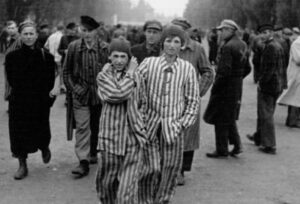“A Future & a Hope” – Introduction
"A Future & A Hope" - Introduction
Zalman Cohen - The Hope of the Liberated Jews (Nyiregyhaza, Hungary)

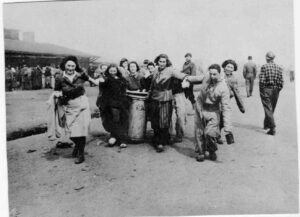
Liberated women in a camp (a)
Devora Berger - The Liberation from the Halberstadt Camp (Lodz, Poland)

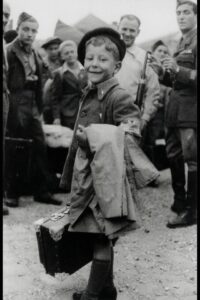
Rabbi Israel Meir Lau - liberation from Buchenwald
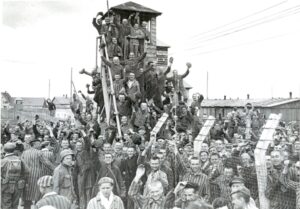
Liberation day in Dachau, some of the Jews are still in prisoner uniforms
Miriam Raanan - The Liberation of Bergen-Belsen (Pressburg, Slovakia)

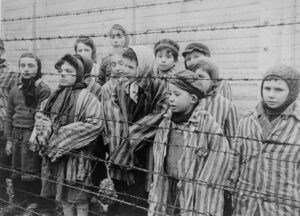
Children in Auschwitz following liberation
Gita Cycowicz - The Meeting with My Mother (Chust, Czechoslovakia)

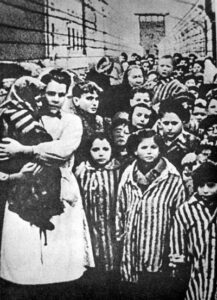
Children in the Auschwitz death camp upon liberation, still in prisoner uniforms
Reflections Following Liberation
Reflections Following Liberation
For several hours we lie idly on the bunks, and suddenly a strange noise shakes the camp. We go out of the barrack to see what's happening.
"A tank is coming!" "A tank is coming!" the people say. A large tank suddenly appears at the camp gates, followed by another and another - they drive around the camp and throw food out of the tanks. Packages of food land on the floor. Most of them contain meat. I watch the spectacle. The prisoners open the boxes with shaking hands and eagerly eat the meat. I am very hungry, but for some reason I do not pounce on the meat as others do. Some strange feeling of restraint keeps me from pouncing like the other people. Perhaps the presence of meat, which I am not used to, repels me a little, I do not know. I just stand and watch, weak and prone to falling.
The air in the camp is filled with silence. Apart from the noise of the tanks, there are not many sounds. No shouts of joy. No commotion. Just silence. Silence after everything. This is the silence of nothingness. No place to return to. No family. No city. No town.
I live, breathe, eat a little here and there. I move from moment to moment, from second to second, like an animal that walks slowly and clumsily, thoughts are almost nonexistent, I am empty, I am hollow. Out of touch.
The days pass lazily. There is some food, some water, and also – freedom. We are no longer slaves. Gradually we get used to the new reality in which there are no Nazi soldiers in charge of us.
I am alone in the world. A faint hope still beats in me that my older brother, Leibel, is still alive. But apart from him, everyone is dead. I know this for certainty and feel the great void in which I exist. There are no Jews left, no family, no brothers, no sisters. Uncles. Nothing. Just a few prisoners who I don't know if you can even call them alive or not.
I try to count all those who were lost, but I can't. So many faces, names, memories that were and are no more. When lists of survivors arrive at the camp, I glance at them, passing by the lists with a sinking and hopeless heart. I don't find a single familiar name there.
How is this possible? Where has everyone gone? The more I think about it, the less I understand. The more my ability to think increases, the less I understand. The pain is too great for me to feel, and my mind is racked with thoughts. How? Is it possible? And maybe all this is just a passing illusion? A bad dream that is not happening in reality?
(Yeranen HaNaar HaNichret – Menachem Brickman)
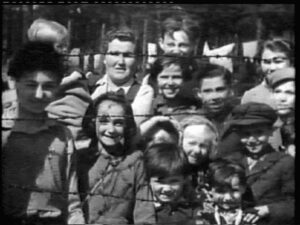
Boys and girls liberated from Auschwitz
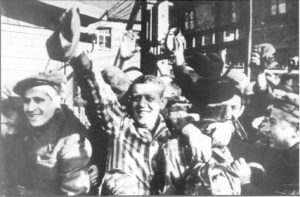
Survivors returning to their hometown disembark on the train platform
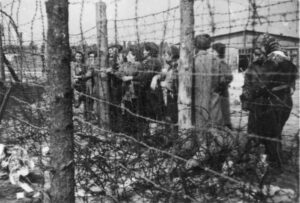
Women behind the barbed wire fence following their liberation from Bergen-Belsen
The Blessing "HaTov V'HaMeiteev" (Who is Good and Does Good) Upon Liberation
The Blessing "HaTov V'HaMeiteev" (Who is Good and Does Good) Upon Liberation
On Wednesday, Iyar 12th, 5705 (April 25th, 1945), the Russians liberated the train passengers.
We imagined the day of liberation in a completely different way, but the reality was different. The SS soldiers who were guarding us on the train fled during the night, leaving other guards in their place. The train traveled until it could no longer continue on its way. Not tanks appeared, but Siberian soldiers from the Red Army riding horses...
The very news of liberation took away my strength. I tried to walk on my own two feet again, and even succeeded a little. I walked along the train cars and met David Naftali Abrahams. He ordered me to say a blessing, and I said the blessing "HaTov V'HaMeiteev."
It was good that I didn't think about the family. The toll was terrible. My father and mother had passed away, as well as Elchanan, Shalom and Batya. I had no information about Shlomo and Shmuel's condition, while Baruch, Bella and I were very sick with typhoid. There was hardly anyone who could stand on their feet, and there was no medical treatment and no medicine. We lay sick and desperate in a remote village southeast of Berlin. What would happen? And where would we end up? Will we survive?
(Yesupar Le'Dor - Yona Emmanuel)
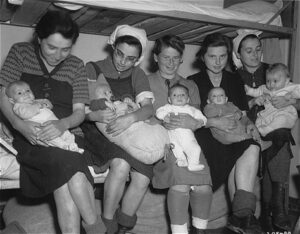
Hungarian women with their babies in Dachau following liberation
Miriam Raanan - Family Reunion (Pressburg, Slovakia)

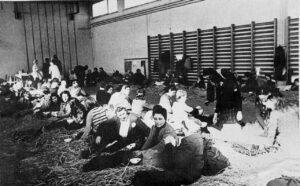
Liberated women in a camp (b)
Bunim Wizhonsky - The "Revival of the Dead" in the Hospital after Liberation (Lodz, Poland)

Chava Bronstein - The End of the War (Warsaw, Poland)

Rivka Weiss – Meeting Anew at the End of the War (Kishkinizs, Hungary)

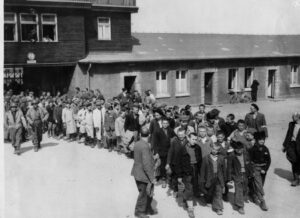
Liberated prisoners in Buchenwald
Shulamit Avdaram - The Shehechiyanu Blessing at the Moment of Liberation (Galicia)

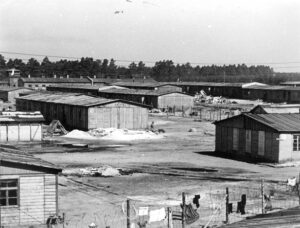
View of Bergen-Belsen at liberation
Meir Stern - Searching for Relatives (Lodz, Poland)

Gita Halberstam - The Liberation from Auschwitz (Slovakia)

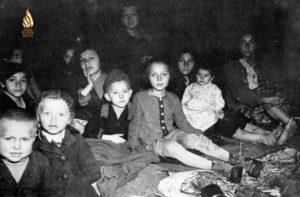
Jewish children liberated from the Lambach camp, 1945
Avraham Yaakov Kalisz - Meeting His Brothers After Liberation (Zilina, Slovakia)

Rabbi Yosef Bramson - The Lost Train and the News of Liberation (Franeker, Holland)

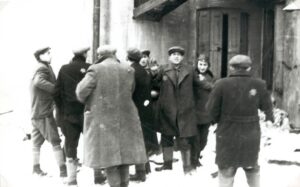
The last Jews of the Lodz Ghetto upon liberation
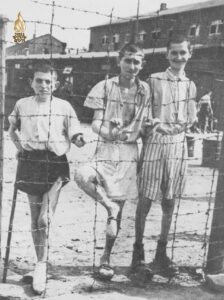
Boys liberated from the Buchenwald camp
Miriam Miller - Liberation on the Way to Theresienstadt (Lvov, Poland)

The News of Liberation
The News of Liberation
On Iyar 18th, 5705 (May 1st, 1945), the news of liberation reached me.
I was somewhere in Germany at the time, inside a besieged train, when suddenly the train stopped completely and the engine driver came out smugly and shouted at us that they had now announced on the radio that the war was over, and we were liberated!
The joy in their hearts soared. Men and women all at once exited the train cars with barely any breath left in their nostrils. The thin, emaciated bodies that looked like the walking dead began first to look for food to satisfy their great hunger. Among them was the Sanz-Klausenberger Rebbe, author of "Shefa Chaim."
Suddenly, a large group of German soldiers on motorcycles emerged from a small airport not far from where the train had stopped, their sadistic faces angry and irritated at their defeat and the dismantling of their Nazi vision, and they began to take out their murderous rage on us. They began to fire volleys of shots in our direction, shouting in German to get back on the train. The killing field in that crazy and chilling inferno was terrible, dozens of men and women who had already gone through the events of the Holocaust, single remnants of their family members who were already on the verge of liberation and redemption from the destruction, fell robbed, innocent victims of the Holocaust, may G-d avenge their blood.
I was forced to sit on the train in fear for many hours, as the train remained still and motionless. But suddenly, through the cracks in the train doors, I saw jeeps of the American military forces moving on the roads and in the fields. I realized that the area had been occupied by the Americans, and the Germans were probably no longer in sight. So I gathered my courage, and together with everyone, with our last remaining strength, we opened the doors widely.
On Iyar 19 (May 2), we were finally liberated. The American soldiers arrived in droves, they announced to everyone with smiles and cheers of joy that the war was over, and we were liberated and free to go our own way.
But the burning memory of the heinous murder of the bloody harvest that we had witnessed only a few hours ago affected our mood, and we completely lost the joy of life.
After hours of waiting and initial preparation, we were ordered to board the train with the goal of traveling towards the Feldading camp.
(Zechor Asher Asa Le'Miriam: Sipur Koroteha Shel Giveret Miriam Bloy - Yosef Aryeh Katz)
Fela Eizowitski - The Liberation in Chamonix, France (Poland - Belgium)

Yosef Ansbacher - The Hope for the Reunification of the Family (Brussels, Belgium)

Gita Cycowicz - News of Liberation (Chust, Czechoslovakia)

Gita Cycowicz - The Shock of Liberation (Chust, Czechoslovakia)

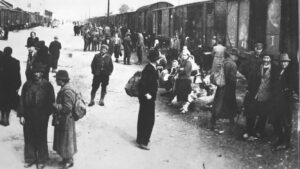
Refugees from the Salzburg DP camp at a train station
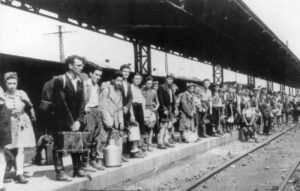
Young Holocaust survivors at the train station in Budapest
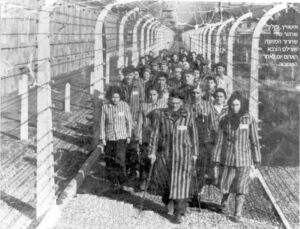
Recreation of the liberation of Auschwitz
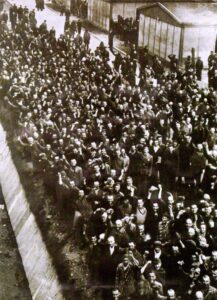
The liberation of the Dachau camp. Camp prisoners come out to greet the liberating American Army.
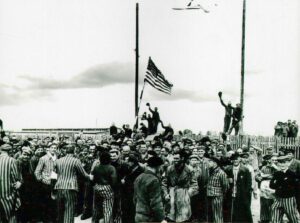
The liberation of the Dachau camp
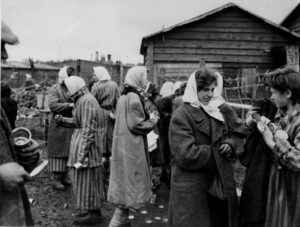
Jewish women in the Bergen-Belsen camp following liberation stand next to the camp gate waiting for food to be distributed
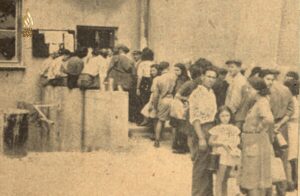
A line up of people searching for their families postwar
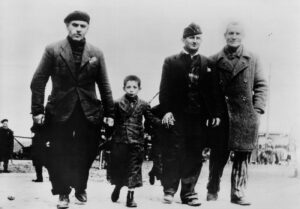
Prisoners from the Buchenwald camp holding the hand of a 7-year-old Jewish boy who managed to hide, April 1945
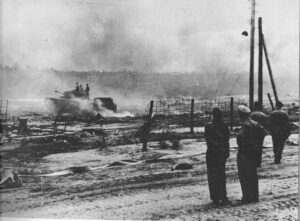
The first British tank to enter Bergen-Belsen breaking down the barbed wire fence of the camp.
Open a Gate for Us
Open a Gate for Us
On Tuesday January 16th, 1945, at about 9 in the evening, were were already sure, almost 100% sure, that none of the German murderers remained on the factory premises.
Then Bunim Yachimowitz approached the gate that separated the factory area from the area where the Jewish prisoners lived in order to tell the prisoners that were were no more Germans on the factory premises.
But the gate to the Jewish camp was locked with a lock and bolt. We broke the locks and opened the gate.
Bunim climbed onto the top of the gate and loudly proclaimed: "Chaveirim, mir zenen frei!" Friends, we are free!).
It is difficult to describe the emotional outburst. The pen falls short of describing the historic gesture, the liberation of over two thousand Jews from the cruel enslavement of the Germans.
It is difficult to describe the hysteria that tooked hold of the liberated Jews. People who had never exchanged a word with each other suddenly hugged and kissed, and even shed tears of joy and happiness. The pain and disappointment would come later. In the meantime, there was a hysterical outburst of joy. People's reactions to the changes that had occurred in their lives were not uniform. Some gave free rein to their emotions, going wild with joy. Some had more restrained and controlled joy, and there were also expressions of uncontrollable crying, of feelings of bereavement and orphanhood. Only now did people feel their loneliness in the world.
At dawn, my cousin Leon, his wife Tosia, and I decided to leave the camp, but what shocked and disheartened us were the angry looks, and especially the sarcastic and venomous remarks directed at us by our Polish neighbours: "There are still so many of you left." This was the "welcome" of our previous neighbours, with whom we had lived in close proximity for nearly a thousand years.
(K'Arar B'Arava - Yehoshua Eibeshitz)






































